During the month of March 2024, we encountered a few weeks of ups and downs when it came to Phabeni’s health. This is always stressful for the team as calves are so fragile and can make a turn for the worse quickly without you knowing why. While Phabeni is doing well now, we wanted to share insight into what we have been busy with on the ground to ensure his health and well-being.
Adine had to leave the reserve for a work trip in the United States. Before going, she looked over Khanyisa’s file, Mopane’s file, Timisa’s file. It was clear from these that between four and five months after arrival, the elephant orphans take a turn, and their condition drops. They stop drinking their milk. They get diarrhea. In these instances, our wildlife vet Dr. Rogers put the orphans on drips to hydrate them. We sourced blood from a donor elephant in the herd and carried out a blood transfusion to increase the calf’s albumin.
While Adine was away, Phabeni showed that he had gained weight during his usual 6 am weighing on our livestock scale. Later in the day, after returning from being with the herd in the bush, he drank his 8 pm bottle. Just after that, his dung looked a bit loose. The next day at 6 am the dung looked better, but Phabeni would not take his 10 am and 12 pm bottles. He drank some of his 8 pm bottle but left 141 ml. He was a bit cranky and pushy. It was hot – 32’C. The Wi-Fi at the orphanage was slow and Joshua struggled to send Adine the normal video updates, which are important so that Adine can help monitor Phabeni around the clock.
Joshua sent Adine a photograph of the wound on Phabeni’s rear, where he was darted with a tranquiliser in November during his rescue. The wound had been healing nicely, but then it would make a sort of pimple and burst with puss. it would heal, burst, get cleaned, heal, build and burst, get cleaned, and so the cycle repeated itself.
The next day, Phabeni drank his milk bottles reasonably well, but he would leave some milk behind. This fluctuated, with Phabeni sometimes finishing a bottle and sometimes leaving most of the milk. His dung was looking good and by the weekend, it was perfect, and he was finishing and enjoying all his bottles.
Over the weekend, Adine received a call from the orphanage in the early hours of the morning, 2 am where she was. It was 9 am at HERD. She missed the call and could not get through to the team again. The signal and Wi-Fi were down at the orphanage. Adine asked her son, Xander, to help get in touch with the HERD team. Xander managed to and reported back to Adine that Phabeni had not been taking any bottles and had diarrhea. The HERD phone was not working. But eventually, Adine managed to get hold of Joshua who explained the situation. She advised him on what to do: where to find electrolytes for Phabeni, and how to keep him hydrated. Calves go from hero to zero in seconds. We have experienced it before, and it is frightening. Tigere managed to get hold of Adine next, with himself, Owen, Joshua, and Godknows on a video call. Together the team ran through the storeroom to locate everything needed to help Phabeni.
Phabeni continued to refuse his bottles throughout the morning, had about a quarter of his noon-time milk, and then refused the 2 pm bottle and electrolytes. Fortunately, his energy was good. The 4 pm and 6 pm bottles were also refused, but the little bull drank water from the trough back at the orphanage and chewed on bana grass. At 8 pm, his dung was loose.
Adine arranged for Dr. Rogers to visit Phabeni first thing on Monday morning to perhaps put Phabeni on a drip and prevent dehydration and any condition loss. During the night, Phabeni refused his 10 pm bottle, continuing to stress the team as we saw more diarrhea arrive. Despite this, and his not taking the electrolytes, his energy appeared good. Adine shared different recipes for formula with the team to try and get Phabeni to drink, the way you might mix things up to get your human toddler to eat a meal. Adine tried recipes that Khanyisa had liked when she was going through similar issues, but Phabeni would not drink.
Adine pushed then for the team to give Phabeni medication by the mouth and fortunately, the bull drank it all. He drank nearly half of the next midnight bottle and went to sleep just before 1 am. Adine pressed Joshua to continue checking Phabeni’s breathing while he slept. The little bull woke for his 2 am bottle and drank about two-thirds of it. Next, at around 3 am he drank about half of the mixture of electrolyte and other medication. No dung followed, no noisy tummy. With the 4 am bottle, Phabeni left about two-thirds. Diarrhea started. More and more dung. Loose and sloppy. Joshua called Adine as the calf’s stomach started to make noises just after 5 am. At 6 am he left a quarter of his bottle.
We couldn’t send Phabeni out with the herd that day as Dr. Rogers was scheduled to administer a drip. Phabeni would not touch his 8 am bottle. Dr. Rogers was stuck in traffic.
Phabeni didn’t take his 10 am bottle. Then Dr. Rogers arrived and administered a standing sedation for Phabeni. He took blood samples and gave Phabeni a four-litre drip with vitamins, Buscopan which relieves the pain of stomach cramps by helping your gut to relax, and a broad-spectrum antibiotic. The wound on the calf’s rear was swollen. Dr. Rogers cleaned it but said he was concerned that the wound still has puss from time to time and wonders if there is not something hard that perhaps broke off and lodged in there – whether a thorn from the bush or perhaps a piece of the original dart – but surely the latter we would have been able to see. Something was inside the wound, causing it to flare up.
Later that day, Adine received news from Dr Rogers, reporting that Phabeni’s blood tests showed a high amylase count, which could point to pancreatitis. The white blood cells (leukocytes) were also on the high side. Overall, there were signs of an infection, which could be related to neutrophils (a type of white blood cell that helps the body fight infection) caused by the wound on his left side.
After Dr Rogers’ visit, Phabeni took his milk bottles throughout the day, as well as the days after. Then three days later, he started refusing his bottles again. Dr Rogers mentioned again that he wondered if there was something inside the wound on Phabeni’s hip that was causing the high infection counts. We were grateful that Dr Rogers had administrated a safe wide-spectrum antibiotic, as it would help with the infection.
We kept Phabeni home at the orphanage while he was still under the weather, but he was not happy with us and would rumble and scream a lot. The carers could pick up that Setombe and Klaserie seemed to be looking for Phabeni in the wilderness, perhaps hearing him. Even though the sound wasn’t audible in the bush to the carers’ ears, elephants have an incredible sense of hearing themselves. No doubt the females were upset as they were not sure why their baby was not with them. They did not know what was happening. Their routine was shaken. They kept on listening… while they browsed not too far away.
Dr Rogers arrived to help Phabeni again, together with Dr Johan Marais, spending more than two hours with the calf. Phabeni was dehydrated – Dr. Rogers gave him five litres of intravenous fluid through the drip, and it took a while before the bull urinated. While Phabeni would not take his bottle, he did drink a lot of water and had good energy. A second round of blood tests was run and showed that the amalyse levels were a lot lower and it was clear that the inflammation had gone down. Dr Rogers was not sure why the little elephant was refusing his milk again. We discussed that a blood transfusion might be a good idea, as carried out on orphans in a similar position previously. We would always rather prevent a terrible situation than try to restore energy and condition from rock bottom.
A week later we received Phabeni’s dung swab’s culture result. Only normal intestinal flora was isolated. No pathogens such as Salmonella could be cultured. The direct smears also only showed normal bacterial flora.
In part two of Phabeni’s medical update, we will share details of the blood transfusion that followed.
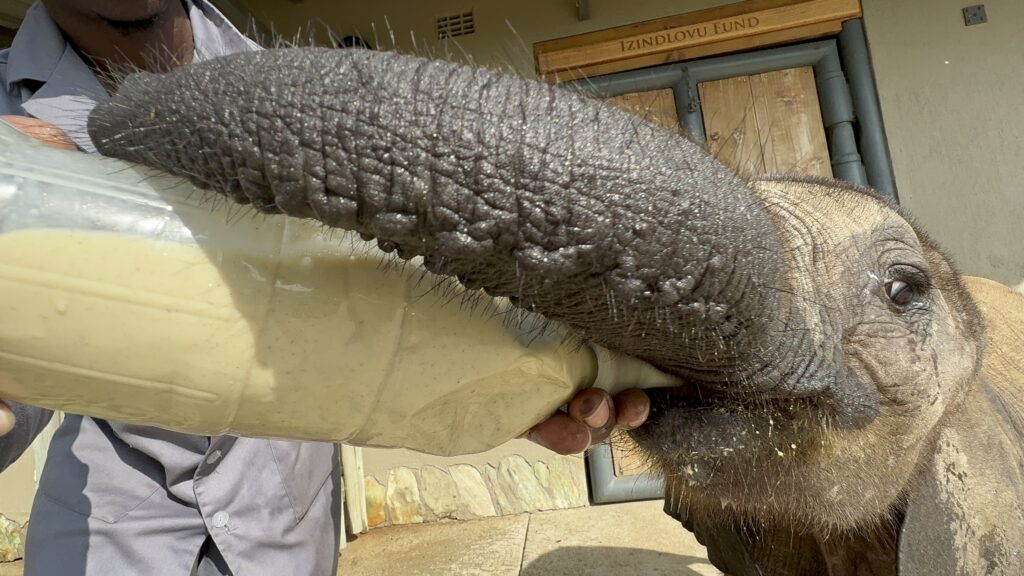



 Comment
Comment
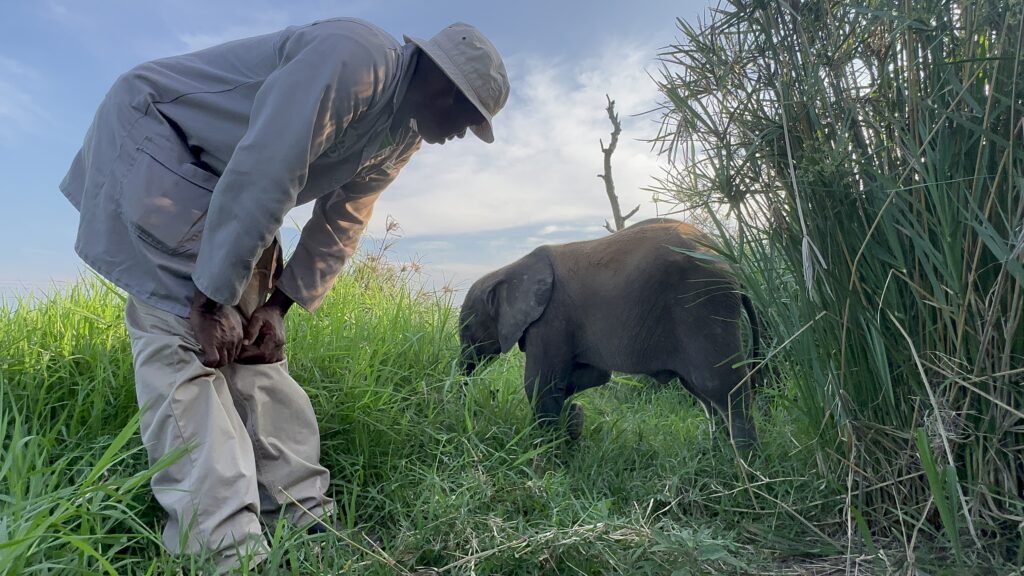
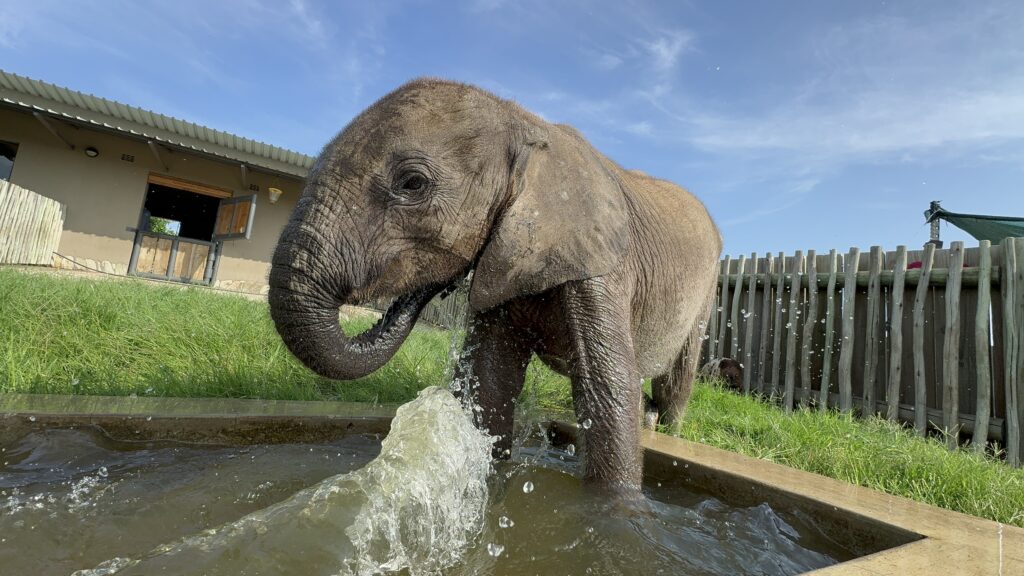
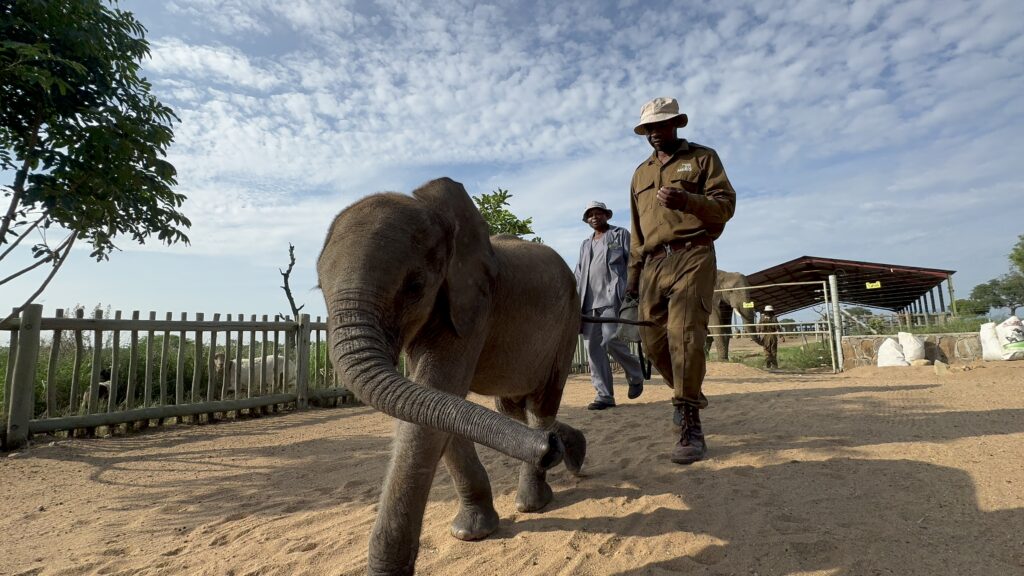
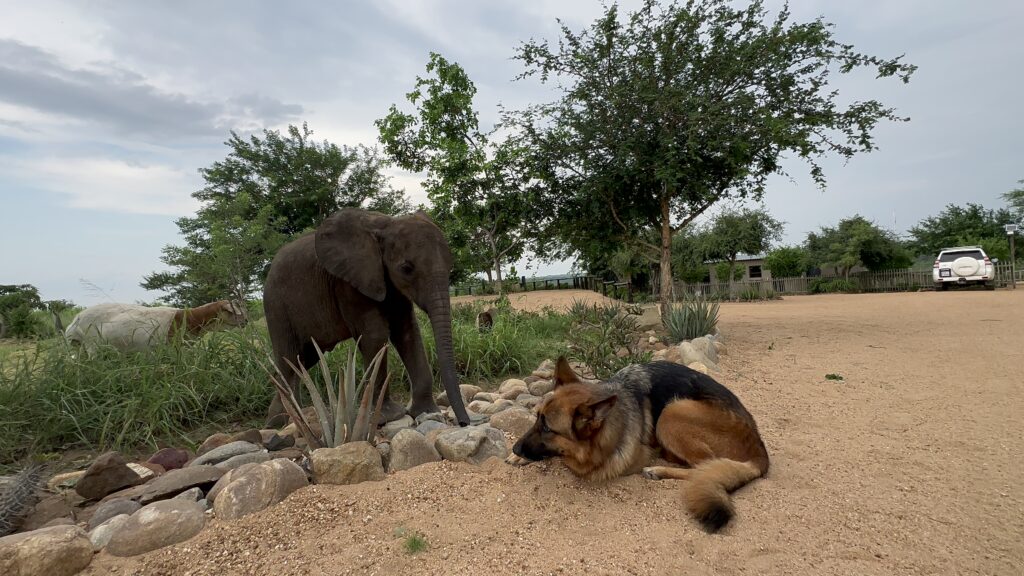
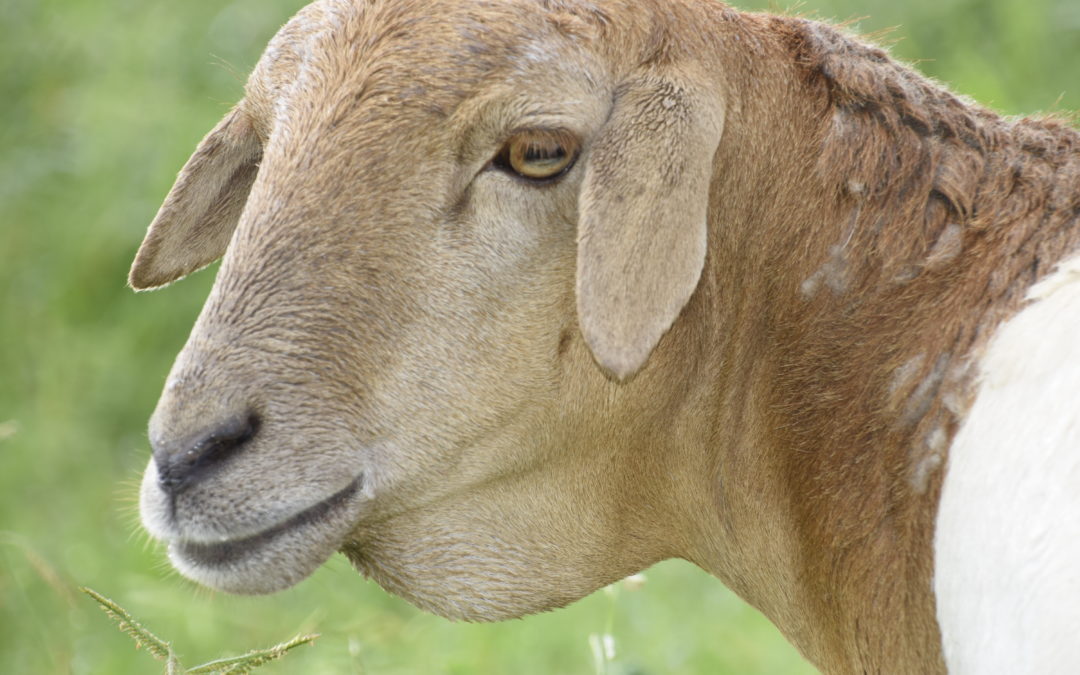

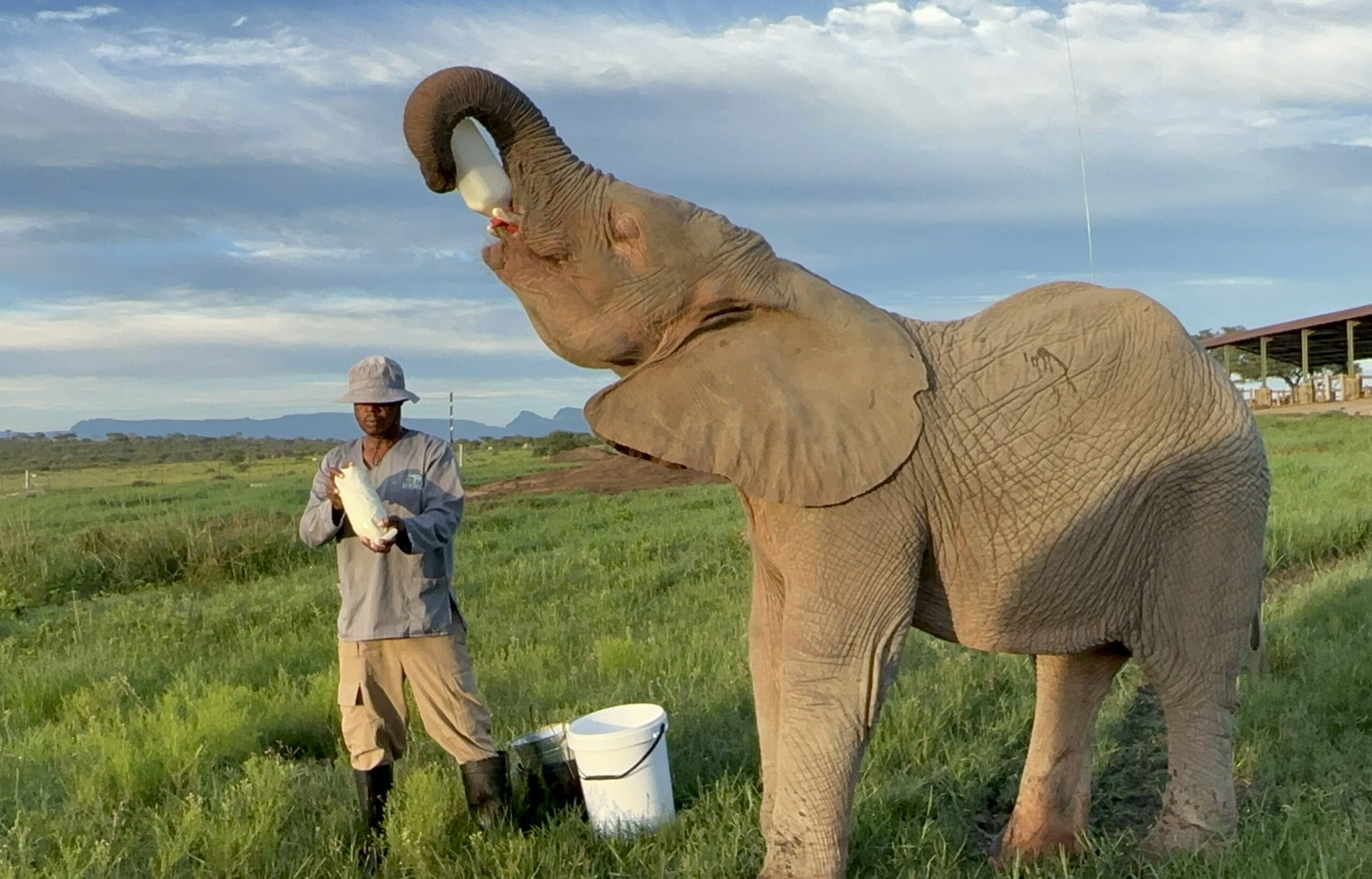



Thank you everyone for your endless hard work and dedication to this beloved little bull.
This was such a great update. Please keep up the great work and prayers to all of the caregivers who are obedient to the call of stewardship.
OMW I’m so glad he’s on the mend we only see the happy side not the trauma of the behind the scenes the team at HERD are amazing thank you for your special love and caring of these Ellie’s I’m so grateful for these updates as it gives me a better understanding of just how much work goes into the caring of baby Ellie’s and even the adults and teens❤️
Praying for baby Phabeni. Get well soon boy ♥️👏🏻♥️
Oh Lord what a stressful time for you all, including Setombe and all Beni’s family. Thank goodness for such a superb Care Team, plus the wonderful Doc Rogers. Since following HERD in 2020, I’ve learned how quickly babies can deteriorate despite timely intervention and treatment. Many superb Elephant facilities have lost babies suddenly and without warning. It devastates and shocks everyone. We query, even doubt, our care but the sad truth is a seemingly healthy baby can be taken in the blink of an eye. Phabeni has made the most amazing progress. He’s a real fighter. Had the unthinkable happened, not one person could have been held accountable. You are left with a million questions and a shattered heart.
Well Darling Beni, by God’s Grace you are still with us and I pray it remains so. Sending Love from me, and I know many others, in 🇬🇧. Stay healthy and happy, secure in the knowledge you are so very Loved by your Elephant Mama and family, The Herd Care Team and Dr. Peter Rogers. Thank you for looking after Beni and working so quickly and efficiently with our Precious Baby Bull Phabeni 👏👏👏👏💙🐘💙🇬🇧🙏
Thank you so much to all of the HERD team for all of the care you gave Phabeni.
Thank you so much for sharing, so appreciative. Always prayers for precious little Phabeni my little baby bull ” in my ♥️”, and for all the beautiful gentle giants, The Herd, always. Thank you all for all you do in caring for these amazing animals and may God bless you all in all ways. 🙏 ❤️ 🌻🙌
Oh no, poor little guy. i sensed something was wrong last month but didn’t know it was all this. I hope he’s okay now! How scary for you all! 🥺 I sure appreciate this update, and I’m glad to have the whole story. I don’t know if my heart could have taken it hour by hour. Thanks to Dr. Rogers too!
I’m so sorry I didn’t know this baby was so sick. Please keep us update so sad for this beautiful baby 🐘.
Love you baby 🐘 ♥️😘🤗🤗🤗🤗🤗🤗.
gosh what a tightrope of anxiousness all round for you. phabeni is in the best hands and you are doing the best you can each step of the way. fingers crossed all will be fine.
I am praying for Pabeni. He is such a little star I know he will overcome these trials. Thank you for sharing the update. I watch HERD daily for my own comfort and peace. You guys do such an awesome job caring for these majestic animals. Get well Pabeni ❤️
sweet phabeni must confused that he is not with setombe. can they xzay the wound to see what might be in there. this way you remove it instead of treating the symptoms and it coming back. praying for little phabeni. sweet elle.
How scary for all of you, including his ellie family.
When I was a kid I stepped on a wooden toothpick, and went to the ER to get it out. The wound acted like Phabenis, it kept opnening up and filling with pus again and again. After about 6 months half of the toothpick I stepped on, suddently came out, dangling around in my sock. The doctors couldnt see it on xray but was shure they got it all out. They didn’t. I think opening his wound to look for whatever may be in there, would be a good idea.
Lots of love to you all and trunk-hugs to Beni. Never scare your carers like this again please. <3
Thank you for saving him!! It is a very delicate balance to keep him alive. I would like to thank the team for all their hard work and the fantastic vets who helped as well!! 👍👍😀♥️
Sending 🙏🏼❤️to heal & strengthen baby Phabeni, especially during his teething stage. I am so impressed by Adine & the team with their due diligence, their attentiveness to anything that is off with baby Phabeni. I hope that if there is a foreign body in baby Phabeni’s ear & hip that the vets can find it in an x-ray & remove it by an exploratory surgery . ❤️❤️❤️🇨🇦
I never realized until now what „fragile“ for baby elephants meant. It is unbelievable that those huge animals that are only put in danger by human hands are so fragile when being babies. The cause for this, I think, lies in their psyche and its unbreakable bond with their mother and extended family. If they loose it, there is no will to live on. I can’t find another explanation.
this is such a worrying time for all….I just hope you can work your magic like you did for meisiekind…I myself am so worried too….God bless you all and with the grace of God…you will pull him through this. I love you all x
iam so glad the little boy is fine now. thank you everyone
waiting for second part.
Prayers that our little girl feels better rael soon and this doesn’t happen again. ❤️
You folks are amazing – I love how you love and care for these majestic animals, especially mothering the babes. Your close monitoring is key to their thriving, surrounded by love and trust … thank you for all the videos – being with you virtually warms my heart and brightens my days – thank you thank you thank you!!!
Oh my this story is traumatizing. ll the carers, Adine and Dr. Rogers thank you so much for all of the time and love you put into helping little Beni. I had no idea how much ups and downs there are to helping these orphans. God bless all of you along with all the elephants. Poor Setombe must have been up in arms over her new little boy. I am so happy to see how much of a fighter Phabeni is but nit gonna lie I will not take future advantage of all is well based on a 20 minute video. You all are truly amazing and this family or elephants are so blessed to be with y’all. Again, thank you so much for all that you do to help the herd thrive.
EESo thankful for this detailed update. Eagerly awaiting parthear how sweet little Phabeni pulled through and how he’s feeling now . The very recent videos seem to sh ow he’s well♥️
This is awful. This little bull has crept into my heart and I’m sure many other of viewers.
Thank you for telling us. Looking forward to the 2nd update.
I will be praying for Phabeni. God heals humans and animals are his creation. I will be praying for this little darling bull, Phabeni. 💙
What a wonderful caring team at The Herd. The Jabulani Herd is blessed to live there. I often think of how safe they are. If they are sick, they have the best care. They have a banquet of food everyday. They are showered with love and kindness.
I pray in Jesus name that Holy Spirit imparts wisdom to the medical team to diagnose accurately and have a solution to help Phabeni get well soon. Thank you my Father, in Jesus name. Amen
Much love, from Liberty in KZN
How grateful I am for your diligence with your work. I hope Phabeni lives a long and fruitful life.
<3
Please tell me asap how baby boy is doing after transfusion. I love him dearly!!
How stressful for the carers especially when we have noted that Phabani could go from bad to worse and vice versa st a moment’s notice. A fearful situation.
God bless you all and 🙏for Phabani.
Thank you for the report on Phabeni’s. Your team is doing a great job caring for him.
Wow. You guys are angels on earth. Your amazing care and detailed observations are to be commended.
Thank you a million times. ❤️🐘🐘
I am so sorry for the poor little boy and of course for the entire worried team😳- I do hope he’s doing better now: lots of love and healing vibes
I wonder what it is, at five months with HERD? This busy, jaunty, playful bull baby, going off his food, needing drips and blood transfers. They are fragile dollies, in spite of their strength, size, and care they recieve. Let’s face it, no baby is better cared for than a HERD baby, whether it’s by humans or elephants. Hell I have a 10 month old human, if I could part with her, I’d leave her in your care at night and Kumbura’s during the day, for all of July and august.
Oh man! I hope little Phabeni is doing better now!
Thank you for this update on Phabeni. It makes me sad that his health is so tenuous. I will pray for him. We all want to see him grow big and strong like Jabulani, Zindoga and the others. Thanks again for all that you. I was fortunate to meet Sebakwe, Somopane and Jabulani in July 2022. I was unable to travel to South Africa on my recent vacation to Africa. I only got as close as Botswana. Continue your loving care of these beautiful creatures. We appreciate you guys so greatly!
oh my word how do you cope with the stress. Poor baby everyone is rooting for you.
We in this Ellie family are all praying for you little Beni!!
We all love you and know that you are strong, and a tough little bull!
You are in the BEST of hands!!
Love from Maryland 🇺🇸🙏❤️🤗🦬🐘🐘🐘….
Poor baby boy but at least he is with his loved ones that will do anything for the little soul.
Good morning to all the HERD staff. Thank you for the hard work, i couldn’t imagine how much you struggle to keep these babies well. I hope every down moments Phabeni went through, is just a bad memory, and from now on he’s good. Keep us updated please, let us know how is it going.
With love,
Enrico
So happy that Phabeni is recovering thanks to the great care of the staff and the doctors! I wish him well.
Such a sweetheart and you guys are so good. Much love ❤️
Ohh no! I’m so sorry to hear about the little bull Phabeni having these issues! I had indeed wondered about the bulge on the little guys rump. it didn’t look right. Is it possible to do an ultrasound there at HERD? I’m not a doctor but I just wonder if that might find whatever is causing this infection? I sincerely hope, and will be praying for, Phabeni to become completely well again! So please let us all pray for this little guy and I believe he’ll get better! Please everyone say a prayer for little Phabeni?!! Thank you folks!! Best regards to everyone there at HERD! I would love to be there to help! Love you guys….hang in there…
Had no idea that baby elephants after seemingly doing well for months all of a sudden can get such a severe physical downbreak. Amazing how vulnerable they are, while looking robust and happy at the same time. I wish and pray for a quick convalescence😇🙏 Love for you all🐘🍀
Very informative thank you very much. I sure hope things work out well for this little Bull.
If possible, please keep me informed. Thank you again!
Prayers going up for Phanebi 🙏🐘💞
It must be frightening and frustrating not to be able to pinpoint the exact root of the problem! The HERD team is so efficient — what wonderful dedication and attention to detail!!🫶🏼🫶🏼🫶🏼
You have such a loving and caring team that is so dedicated to the herd. I’m so thankful that Phabeni got the care that he needed and nothing too serious, bless his heart! if only they could say how they feel, instead we must rely on their reactions and behavior. Bless everyone for their skilled and caring service! God bless!
Thanxs SO very much for keeping us in the loop..
God bless each and everyone of you.
To all the carer’s there that watch over the HERD and everyone that’s involved with Phabeni’s well being thank you. It is heart wrenching when the little ones go through these set back’s they are such treasures. ❤🐘🦣🙏❤
Your medical description of Phabene’s care is fascinating.
Of course, I also wish him the best. The care team is wonderful but you must all be exhausted taking care of the little bull
I’m anxiously awaiting the update on how the little bowl is doing and praying for him and the team at HERD I love your channel
Thank you for the updates! The carers and HERD worry about Phabeni! Keep up the good work of caring for that little feisty bull. Prayers!
Thank you for this report – so helpful and insightful. What enormous care and effort you all take and put in! It is so inspirational in these dark times we are living in. As a widowed pensioner, I just wish I could donate more than I do to help these magnificent creatures, and you all…… equally magnificent in your devotion! You are close to my heart and in my prayers, and I know our little busy seuntjie will be restored to full health.
Please lord let him Phabeni get better 🙏🩶🐘. I was wondering haven’t seen any videos of him and the Herd. Please give him strength and the carers for recovery.
I didn’t realise that the calves health could change and deteriorate so quickly.So it really is so frightening.!! I thought ‘that’s great,the little calf has been rescued and taken to Herd orphanage, he/she will be okay now.!! Didn’t realise how much work,care and vigilance is still involved in these beautiful, fragile creatures young lives.!! A huge thank you and miles of admiration for Adine, carer’s and vets for getting these babies through a very critical time’s in their young lives.!!
Oh dear little Phabeni,❤️ I am so sorry to read about you being ill. I pray that vey soon you will be feeling much better! Dr. Roger’s ,your vet, is taking very good care of you along with your Caretakers. God bless you little guy! Hope you are better real soon!🙏🏻
SO glad he is better.. he could not have been in better hands.. the Carers are just amazing.. AND Adine you are amazing to still be in touch every day whilst you were Away!! Sending Much love to that gorgeous boy Phabeni…
God bless you all for your fine and dedicated care of these beautiful Elephants. God bless and heal baby Phabeni!
Thank you everyone at HERD. I am sorry that the calf is sick, but I know that you can all be trusted to give him optimal care to restore him to perfect health. God bless you all.
I am praying hard for Phabeni along with Setombe and Klaserie. There is definitely a strong bond with these 3 so I can only imagine how worried they were along with Adine and the carers.
Thank God for Dr Rogers!!!! Im not gonna lie Im very scared but I know Phabeni is in the best hands. Thank you all for helping him and may God be with all of you and the elephants.
I have been praying for little Phabeni and all the carers–and Adine. I will add Dr. Rogers and that God will provide wisdom in the medication of the baby elephant. I love you all in the love of Jesus Christ!
I have been following all of you, two and four legged of the Jabulani herd for several months.
Thank you for sharing Phabeni’s care plan with us. I have so much respect for the carers, Adine and the medical staff. I’m sending love and healing to little Phabeni as well as a donation.
Ramona Beck, Columbia Station, Ohio. U.S.
I think your vet is correct. Similar problem with a young colt. Abscess would burst, refill, burst… Periods of illness, temps etc,.
Vet finally operated, totally excised the abscess, found a stone deep inside flank. He put in a drain and packed the wound. The packing and drain were gradually removed over a period of 2 weeks to allow the wound to heal from the bottom up to skin level.
How you would do that with an elephant….. only you and the vet would know. Good luck. Give Phabeni a big cuddle from me.
We love you Phabeni ❤️ We are happy that you are okay now, thank you to all the carers that looked after him in that challenging time❤️
Oh, my PRECIOUS Phabeni!
When I logged on today at lunchtime and saw he had a turn in health, I completely panicked. I love this little critter and follow him daily.
I wish I could kiss him from America.
I love you Phabeni! Please feel my energy.
Joy
Thank you so much for this detailed account of little Phabeni! Bless his little heart!❤️
I had mentioned, a while back in a comment on one of the videos concern about jis healed over wound looking swollen, but was rather brushed off. As a retired R.N. I know there is concern when a human wound heals from outside over still infected wound. Many times to have wound heal from inside to the outside, the wound is packed with iodine soaked gauze and sometimes a drain is inserted to collect fluid from building up in the wound. Could that help Phabeni?
Former nurse here as well, and I totally agree! Something is very wrong if a wound from November is still abscessing, bursting, trying to heal, then re-abscessing over and over again. The little bull has to have near constant infection in his body if this wound cannot heal. It’s time for wound care intervention and, if there is a foreign body in the wound, IT MUST BE removed. My heart hurts for this baby Ellie and we all want him well!
Thank you for your comment and concern. As per our blogs, we have shared that the wound healed, but the loose fragment inside needs to be removed – we are planning to do so once Phabeni is stronger and of optimum health to endure such a huge operation.
The surgical process is not simple. An elephant’s skin is thick and the small fragment is quite deep. Cutting in 7cm blindly will do more damage. Thus, we need to get a sonar machine, an X-ray machine as well as a radiologist, Dr Rogers to perform sedation, and Dr Johan Marais as a surgeon. We will go ahead once able to rent and acquire the desired machines when they are not occupied for human use, and once Phabeni has gained weight.
Watched the blood transfusion from Bad/Now Good Boy Mambo, with hydrating fluids also, and send good energy to the Carers and Phabeni for their work and his rapid recovery. He may get some orneriness from Mambo’s blood, but that will hopefully help with little Phabeni’s fight towards total recovery. Rumbling to you all, with poritive thoughts, from Alaska, USA – Nameste, Mick
my heart is in my mouth. I hope baby phabeni is all better soon I love watching all your elephants on the you tube. xxbest wishes to you all. you’re special people. sincerely Lisa.
I’m very confused about why, if the dart wound has been present since November and the doctor has stated multiple times there’s likely something inside the wound, why hasn’t he gone in to remove it or debride the wound and pack it with sterile gauze? It’s confusing to know that it keeps getting inflamed, pus keeps developing, the abscesses keep bursting, and yet the baby bull’s wound is simply cleaned. The wound is not healing and there’s a reason for that. I hope and pray there is a plan to do something other than wait and watch, because this little boy is clearly very fragile right now. He’s being sedated already, so that would seem like a good time for hands on wound care. And he might get mad about not going into the bush for a while to let the wound heal, but he’ll get over it. I’d rather him be mad, healthy, and alive instead of un the nun and succumbing to complicatio s from a constantly reinfected wound.
Thank you for your comment and concern. As per our blogs, we have shared that the wound healed, but the loose fragment inside needs to be removed – we are planning to do so once Phabeni is stronger and of optimum health to endure such a huge operation.
The surgical process is not simple. An elephant’s skin is thick and the small fragment is quite deep. To cut 7cm in blindly will do more damage. Thus, we need to get a sonar machine, an X-ray machine as well as a radiologist, Dr Rogers to perform sedation and Dr Johan Marais as a surgeon. We will go ahead once able to rent and acquire the desired machines when they are not occupied for human use, and once Phabeni has gained weight.
sweet baby 💜💜💜 I’m so glad you all take such good care of the elephants 🐘 ❤️
Little Phabeni has stolen my heart. I look for information about his health. God bless you all. Please whisper my name to him and tell him I love him.